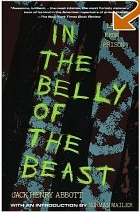This article needs additional citations for verification .(August 2009) |
 Cover of the paperback edition | |
| Author | Jack Henry Abbott |
|---|---|
| Language | English |
| Subject | Prison life |
Publication date | 1981 |
| Publication place | United States |
| ISBN | 978-0-679-73237-2 |
| OCLC | 23020567 |
| 365/.44/092 B 20 | |
| LC Class | HV9468.A22 A37 1991 |
| Followed by | My Return |
In the Belly of the Beast is a book written by Jack Henry Abbott and published in 1981.
Contents
Jack Henry Abbott was an American prisoner and the book consists of his letters to Norman Mailer about his experiences in what Abbott saw as a brutal and unjust prison system. Mailer supported Abbott's successful bid for parole in 1981, the year that In the Belly of the Beast was published. [1]
The book was very successful, and on July 19, 1981, The New York Times published a mixed to positive review. However, the day before, Abbott had killed waiter Richard Adan during a dispute at a restaurant called Binibon on 2nd Avenue in the East Village of New York City. Abbott was eventually arrested, convicted of manslaughter, and returned to prison for the rest of his life until his suicide in 2002.
Adan's widow sued Abbott, winning the multi-million dollar royalty payments for Belly; Abbott received only a $12,500 publishing advance. [2]